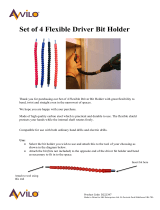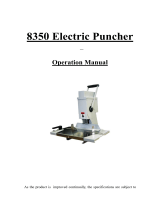
1.0 Introduction
3
TABLE OF CONTENTS
1.0 Introduction .......................................................................................................................................2
2.0 Safety ................................................................................................................................................4
2.1 Precautions ...................................................................................................................................4
2.2 Power Lockout Procedure ............................................................................................................4
2.3 Warning Label Definitions .............................................................................................................5
3.0 Packing List .......................................................................................................................................6
4.0 Specifications ....................................................................................................................................7
5.0 Installation Guide ..............................................................................................................................8
5.1 Uncrating the Paper Drill...............................................................................................................9
5.2 Installing the Table and Backgauge .............................................................................................9
5.2.1 Using Standard Backgauge:..................................................................................................9
5.2.2 Using Auto-Trip Backgauge: .............................................................................................. 10
5.3 Installing the Drill Blocks and Drills ............................................................................................ 11
5.4 Hydraulic Level Check ............................................................................................................... 11
5.5 Hooking up the Power Line ....................................................................................................... 11
5.6 Installing the Chip Container ..................................................................................................... 12
6.0 Operation ....................................................................................................................................... 13
6.1 Starting the Machine .................................................................................................................. 13
6.2 Operating the Drill ...................................................................................................................... 13
6.3 Adjusting the Vertical Stroke ..................................................................................................... 13
6.4 Setting the Distance between Drill Heads ................................................................................. 13
6.5 Setting the Backgauge Position ................................................................................................. 14
6.6 Using the Side Guide ................................................................................................................. 14
6.7 Adjusting the Stroke Speed ....................................................................................................... 14
6.8 Removing the Cutting Blocks .................................................................................................... 15
6.9 Removing the Drills from the Spindle ........................................................................................ 15
7.0 Drilling Tips .................................................................................................................................... 16
8.0 Accessories for Challenge Paper Drilling Machine ........................................................................ 17
8.1 Genuine Challenge Hollow Drills ............................................................................................... 17
8.2 Challenge Drill-Ease Lubricant Stick ......................................................................................... 18
8.3 Challenge Drilling Blocks ........................................................................................................... 18
8.4 Handi-Sharp Drill Sharpner........................................................................................................ 18
8.5 Hollow Drill Sharpener ............................................................................................................... 18
8.5.1 Using the Chip Remover .................................................................................................... 18
8.5.2 Using the Drill Sharpener ................................................................................................... 18
8.6 Right Side Guide Kit .................................................................................................................. 19
8.7 Auto-Trip Backgauge ................................................................................................................. 19
8.7.1 Setting the side guide stops ............................................................................................... 20
8.8 Fixed Gages .............................................................................................................................. 20
8.9 Two-Hand Control Kit ................................................................................................................ 21
8.10 Drill Shield Kit (Standard on S/N’s 135901 and up) ................................................................ 22
9.0 Maintenance Guide ........................................................................................................................ 23
9.1 Routine Maintenance ................................................................................................................. 24
9.1.1 Daily .................................................................................................................................... 24
9.1.2 Weekly (or every 40 hours of operation) ............................................................................ 24
9.1.3 Monthly ............................................................................................................................... 24
9.1.4 Yearly ................................................................................................................................. 25
9.2 Adjustments ............................................................................................................................... 25
9.2.1 Table Position Adjustment .................................................................................................. 25
9.2.2 Belt Tightness Adjustment .................................................................................................. 25
9.3 Hydraulic .................................................................................................................................... 27
9.3.1 Recommended Oils ............................................................................................................ 27





















